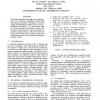Free Online Productivity Tools
i2Speak
i2Symbol
i2OCR
iTex2Img
iWeb2Print
iWeb2Shot
i2Type
iPdf2Split
iPdf2Merge
i2Bopomofo
i2Arabic
i2Style
i2Image
i2PDF
iLatex2Rtf
Sci2ools
165
click to vote
IJCAI
1989
1989
Constraint Satisfaction with Delayed Evaluation
This paper describes the design and implementation of a constraint satisfaction system that uses delayed evaluation techniques to provide greater representational power and to avoid unnecessary computation. The architecture used is a uniform model of computation, where each constraint contributes its local information to provide a global solution. We demonstrate the utility of the system by formulating a real-world scheduling problem as a constraint satisfaction problem (CSP).
Constraint Satisfaction | Constraint Satisfaction Problem | Greater Representational Power | IJCAI 1989 | IJCAI 2007 |
Related Content
| Added | 07 Nov 2010 |
| Updated | 07 Nov 2010 |
| Type | Conference |
| Year | 1989 |
| Where | IJCAI |
| Authors | Monte Zweben, Megan Eskey |
Comments (0)

